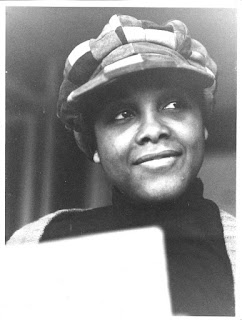The 1969 interview, conducted
by Commissioner William H. Booth of the New York City Commission on Human
Rights, sheds light on stories in her famous book
By Roscoe Barnes III
Chairman, Anne Moody
History Project
Copyright© 2017
#AnneMoody
-----------------------------------------------------
 |
| Anne Moody (1940-2015) ---------------------------------------------------------------- |
Monday, Oct. 9, 2017, was the day I wanted to scream, “Eureka!”
The reason? I found an audio recording of civil rights pioneer Anne
Moody, author of Coming of Age in
Mississippi. And it's nearly 30 minutes in length.
I was using Google to search for an article in The New York Times when I stumbled across a link for a 1969 audio recording
of Moody. When I saw it, I felt a sense of nervousness and excitement because I
didn’t know that the recording existed. I had previously searched for both
audio and video recordings of her and had only found a short video clip of her
at the Woolworth sit-in in 1963, but there was no sound. No recording of her
voice. I had read her book, learned of her speaking ability, and spoken with a
number of her family members, but I had not heard her voice. What did she sound
like?
When I found this recording, I found an important piece of history, a
significant link to our past. It was, as scholars have put it, a real treasure.
And it seemed to fall from heaven. It was exactly what I needed.
The recorded interview is conducted by Commissioner William H. Booth of
the New York City Commission on Human Rights. It is presented online courtesy
of the NYC Municipal Archives WNYC Collection. The interview is part of the
series, “The Black Man in America,”
which, according to Booth, is “devoted to examining the history and life of
African Americans and the contributions they have made -- and are making -- to
the material, cultural and spiritual wealth of this county.”
In 1969, the time of the recording, Moody was 28 years of age and
married to Austin Straus, a young Jewish poet. They were living in New York.
Her book, Coming of Age in Mississippi,
was published a year earlier by Dial Press. Booth notes that the book had won “wide
acclaim.”
Angie Creech Green, a
retired English teacher, listened to the recording and said she was impressed
with the former civil rights worker: “She is so articulate and holds her ground
with the interviewer.”
Moody’s sister, Frances
Jefferson, was touched by the recording. After listening, she offered a word of
gratitude.
“Thank you so much,” she
said. “It’s lovely to hear my sister’s voice.”
Moody grew up in the
segregated south where she faced racism and bigotry while trying to overcome
poverty. She was born in 1940 in the small rural town of Centreville, Miss. She
was raised by parents who worked as sharecroppers in Wilkinson County in
southwest Mississippi. In the interview, Moody “shares her views on prejudice,
and her eventual realization that the issues she has confronted are in fact
prevalent in many other parts of America and the world,” according to the WYNC
website.
The interview opens with
Booth asking Moody about her book being compared with Manchild in the Promised Land (1965), a novel by Claude Brown, and Down These Mean Streets (1967) by Piri
Thomas.
Moody replies by stating: “I
would say any book … primarily written by a Negro and concerns his struggle…
his struggle to exist, can be compared to Manchild
… [It] can certainly be compared to the life of any Negro in America, I would
say. In a certain way… we’re all in same bag.”
Moody notes that her “book
is a little different … because life in the south, life in the rural south, is much
different from life in the ghetto.”
Throughout the interview,
Moody recounts some of the stories narrated in her book. She also elaborates on
some of the sensitive stories that are now well-known from her book, including
the hatred she felt towards blacks for not standing up to racism, and the
hatred she felt towards whites for terrorizing and killing people of color. She
mentions Emmett Till, who was 14 when he was lynched in 1955 in Mississippi. She
also talks about the impact of poverty, and how she often went hungry.
When asked about her life
growing up in the south, Moody said the thing that stood out for her was “being
hungry most of the time” and waiting for her mother to come out of the field.
She said she was also lonely.
I invite you to take
a moment and listen to this piece of history. Discover Anne Moody. Hear her
voice. Feel her passion. Begin right here.
Reference:
The NYPR Archive Collections
(Feb 16, 1969)
Website: http://www.wnyc.org/story/anne-moody
----------------------------------------------------------------------------------------
For more information:
Questions about the Anne
Moody History Project may be directed to Roscoe Barnes III via email at doctorbarnes3@gmail.com or roscoebarnes3@yahoo.com For updates
on Anne Moody history and the on-going work of this community service project,
simply follow this blog or follow AMHP on Twitter
(@AnneMoodyHP). #ComingOfAgeinMississippi

Tears of joy! I was so excited to hear Anne Moody. I love this woman so much. Thank you for this finding. Im overly appreciated. I sent a copy to my history professor. Thank you so much. -Jasmine moye smith. Jasminemoyesmith1@gmail.com
ReplyDeleteYou're welcome! :-)
ReplyDelete